Hãy nhập câu hỏi của bạn vào đây, nếu là tài khoản VIP, bạn sẽ được ưu tiên trả lời.


Không có từ để hỏi:
- Mrs Yen asked Hoa if she was a student
- She asked her friend if she liked English
- Mrs Yen asked the students whether they had done their homework the day before
- He asked his friend whether he would go to Ha Noi the next day
- My dad asked my brother if he was playing video games then
Có từ để hỏi :
- My friend asked me where I had gone the day before
- My mom asked me what I was doing then
- She asked her friends where they were from
- My mom asked me what I eaten the day before
- She asked her friend where she bought that car
Mệnh lệnh :
- My mom told me to do my homework
- My dad told me to give him a newspaper
- My mom told me not to leave the house
- My mom told me not to go out with my friends tonight
- My teacher told us to do our homework 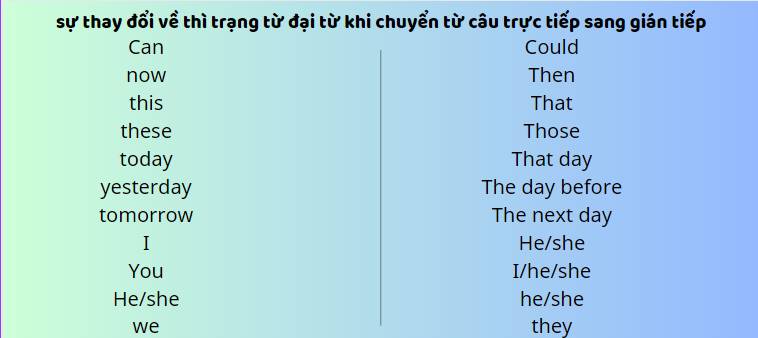

1. Nam said he was told to be at school before 7 o'clock
2. Thomas said all the students would have a meeting the following week
3. She said her parents were very proud of her good marks
4. The teacher said all the homework had to be done carefully
5. Her father told her that she could go to the movie with her friend
6. She said she might visit her parents in summer
7. The teacher said they could collect old book for the poor student
8. She said she didn't buy that book
9. The boys said they had to try their best to win the match
10. Her classmate said that Ha was the most intelligent girl in their class



ĐỔI CÂU NÀY SANG GIÁN TIẾP HỘ MÌNH VỚI
He said to the girl : " don't sit on my bed , sit on this chair please ! "
=>He told the girl not to sit on his bed, sit on that chair.

1 She asked him if he liked eating dog meat that day
2 He asked her if she had ever seen a ghost
3 He asked me if I would go to the cinema with a .... that night
4 I asked her how she had gone to school the day before
5 I asked him what he was doing in that exam then


I. Khái niệm:
Lời nói trực tiếp (direct speech) là sự lặp lại chính xác những từ của người nói.
Lời nói gián tiếp (indirect/reported speech) là lời tường thuật lại ý của người nói, đôi khi không cần phải dùng đúng những từ của người nói.
II.3 nguyên tắc cần nhớ khi chuyển từ câu trực tiếp sang gián tiếp:
Đổi ngôi, đổi tân ngữ
Lùi thì
Đổi cụm từ chỉ thời gian, nơi chốn
Cụ thể như sau:
Rule (Quy tắc) | Direct speech (Trực tiếp) | Reported speech (Gián tiếp) |
1. Tenses (Thì) | Present simple (V/Vs/es) | Past simple (Ved) |
Present progressive (is/am/are+Ving) | Past progressive (was/were+Ving) | |
Present perfect (have/has+VpII) | Past perfect (had+VPII) | |
Past simple (Ved) | Past perfect (had +VpII) | |
Past progressive (was/were +Ving) | Past progressive/ | |
Past perfect | Past perfect | |
Future simple (will +V) | Future in the past (would +V) | |
Near future (is/am/are +going to+V) | Was/were +going to +V | |
2. Modal verbs | Can | Could |
3. Adverb of place | This | That |
These | Those | |
Here | There | |
4. Adverb of time | Now | Then |
Today | That day | |
Yesterday | The day before/ the previous day | |
The day before yesterday | Two days before | |
Tomorrow | The day after/the next (following) day | |
The day after tomorrow | Two days after/ in two days’ time | |
Ago | Before | |
This week | That week | |
Last week | The week before/ the previous week | |
Last night | The night before | |
Next week | The week after/ the following week | |
5.Subject/Object | I / me | She, he /Her, him |
We /our | They/ them | |
You/you | I, we/ me, us |
III. Cách chuyển câu trực tiếp sang câu gián tiếp
1.Câu trực tiếp ở dạng câu kể/tường thuật:
Câu gián tiếp:
S + | said | that + | Clause |
VD:
“I’m going to visit Japan next month”, she said. → She said that she was going to visit Japan the following month.
“He picked me up yesterday”, Lan said to me. → Lan said to me that he had picked her up the day before.
2.Câu trực tiếp ở dạng câu hỏi
Câu hỏi Yes/No question
Câu hỏi Yes/No question là câu hỏi mà người nghe sẽ phải lựa chọn trả lời Yes/No cho mỗi câu hỏi.
Câu gián tiếp:
S + | asked | if | + Clause |
VD:
“Do you love English?”, the teacher asked. → The teacher asked me if/whether I loved English.
“Have you done your homeworked yet?”, they asked. → They asked me if/whether I had done my homework yet.
Lưu ý: Nếu trong câu trực tiếp có từ “OR NOT” thì câu gián tiếp bắt buộc phải dùng WHETHER
“Does she roses or not?”, he wondered. → He wondered whether she d roses or not.
Câu hỏi Wh-questions
Câu hỏi Wh-questions là câu hỏi bắt đầu bằng từ hỏi Wh- (What, Where, When, Which, Why, How…)
Câu gián tiếp:
S + | asked | + Clause (Wh-word + S + V(thì)) |
VD:
“Where do you live, Nam?”, asked she. → She asked Nam where he lived.
3. Câu trực tiếp ở dạng câu mệnh lệnh (Vinf/ Don’t + Vinf, please)
Câu gián tiếp:
S + | asked/told/ordered/advised/wanted/warned | + sb + (not) to Vinf |
VD:
“Open the book page 117, please”,the teacher said. → The teacher asked us to open the book page 117.
“Don’t touch that dog”, he said. → He asked/told me not to touch that dog.
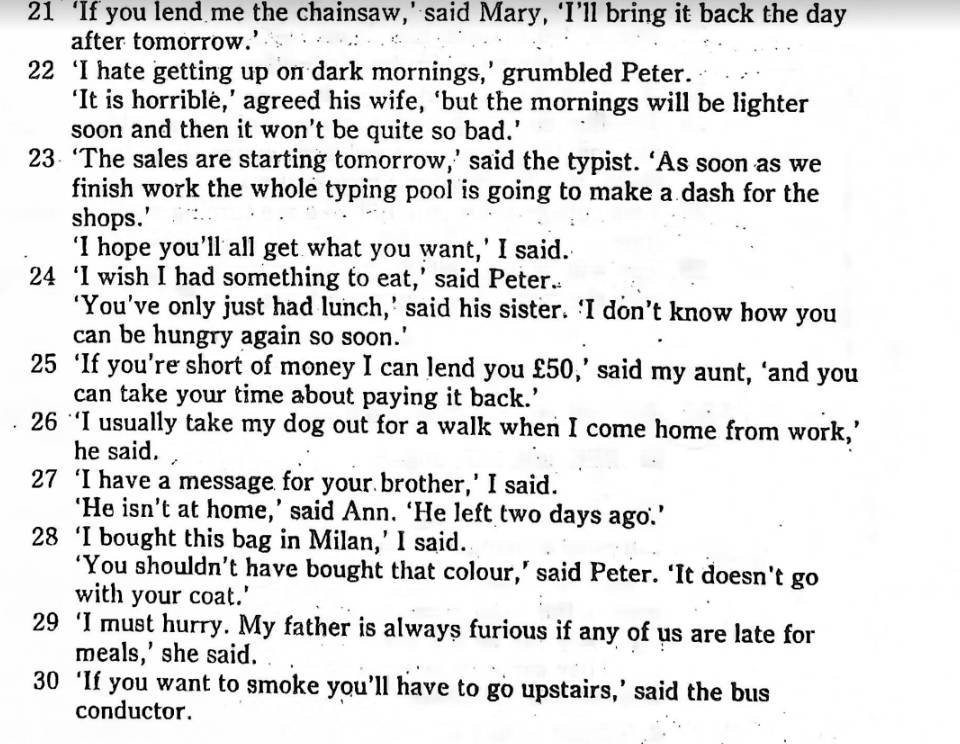
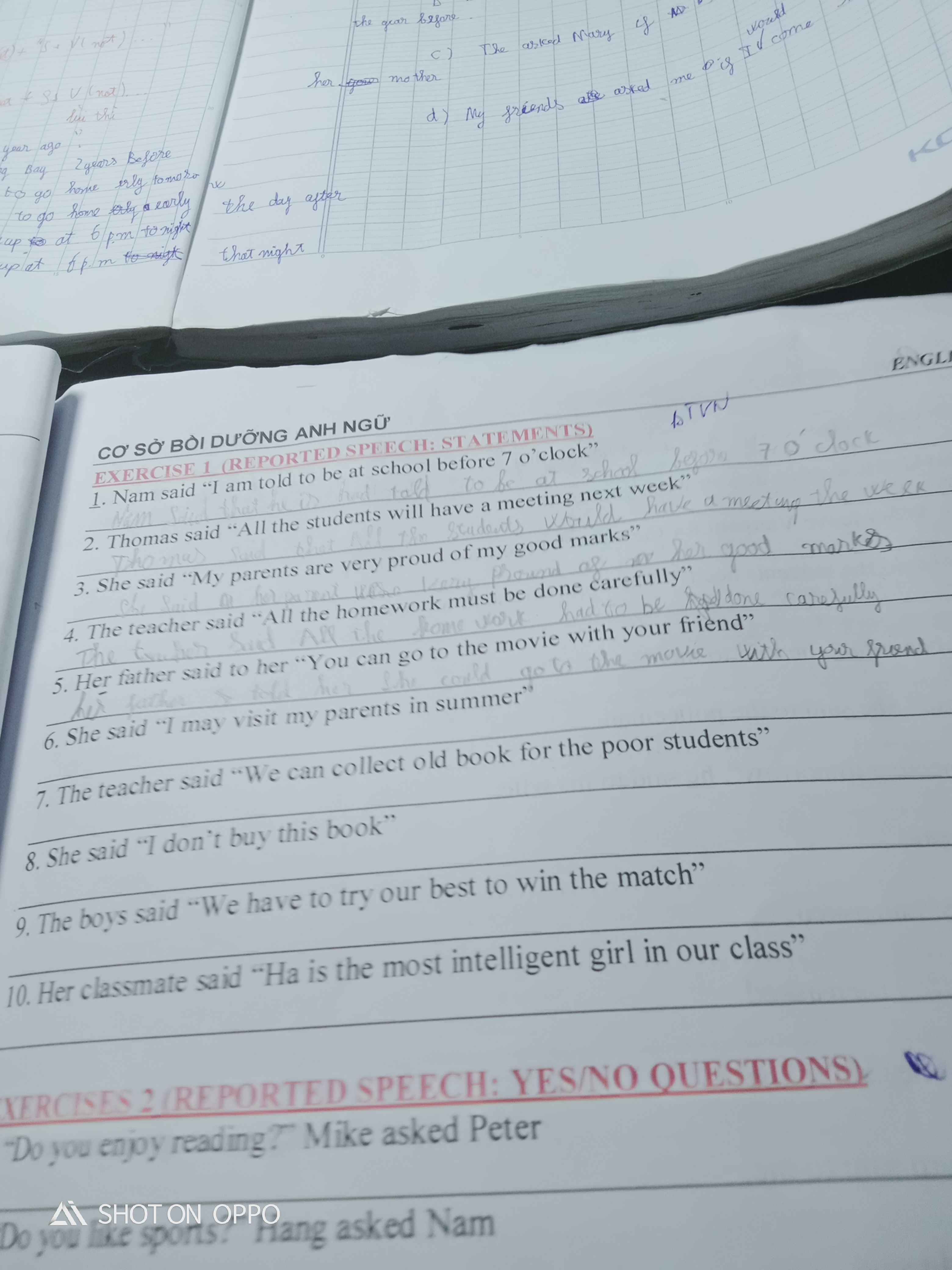
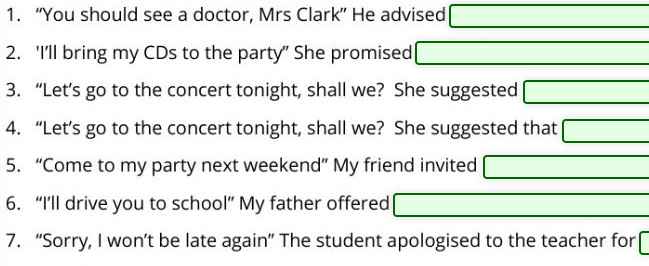
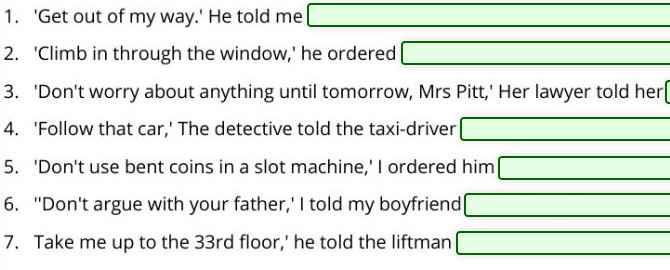
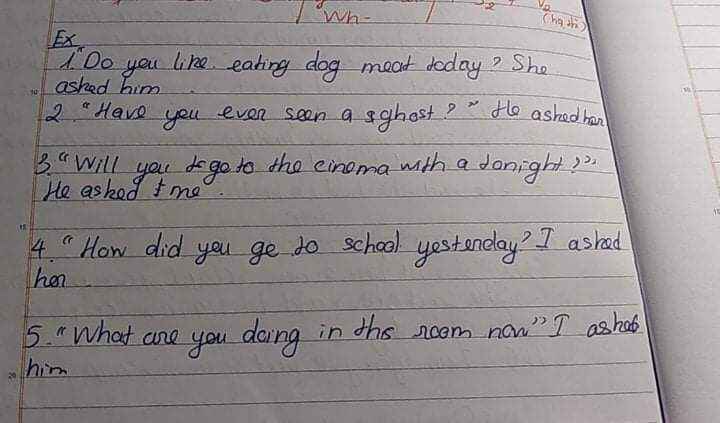
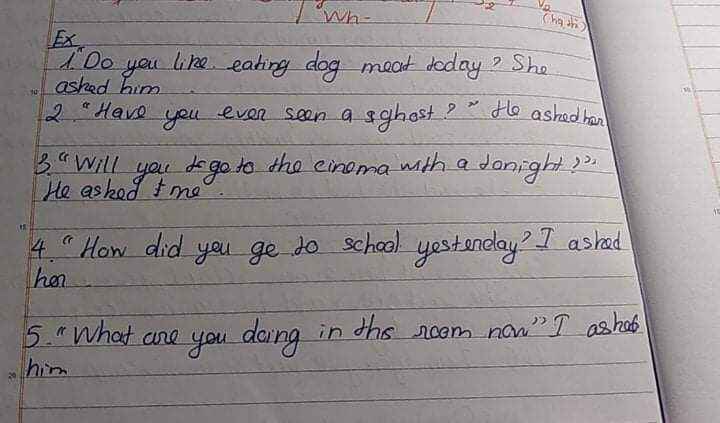
1 Jean advised Bill not to cook the fish for too long
2 I suggested Brian (should) go and see the Sound of Music
3 Jack warned Tim not to take the A20 in the rush hour
4 Ann insisted that Sophia stay at the night
5 Mary invited Helen to come to lunch on Sunday
6 Clare reminded Andy to buy some milk
7 The customer finally decided to take the brown pair
8 Bob denied taking Sue's calculator
9 Dick's mother told him not to smoke in his room
10 She told me if she knew French well, she would go to France to study
Đề câu cuối có chữ " Gamma*d " lạ nên mình đổi thành " she would " nha, câu điều kiện loại 2=)
1 Jean advised Bill not to cook the fish for too long
2 I suggested Brian go and see the Sound of Music again
3 Jack warned Tim not to take the A20 in the rush hour
4 Ann insisted that Sophia stay the night
5 Mary invited Helen to come to lunch on Sunday